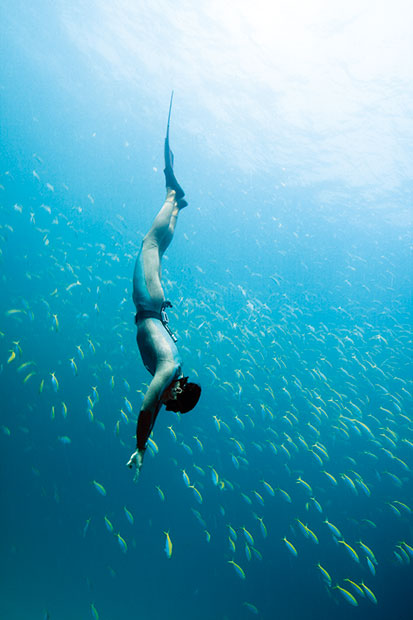In principle, freediving is simple and perilous: divers take one breath, then dive as deep as they can, with no tanks or air, and come back up again. Watch a video of this — or Luc Besson’s 1988 film The Big Blue — and you have to hold your own breath, because it is beautiful, streamlined, pitiless: a human in the most powerful and unnatural element for humans.
The beauty of freediving is that it does not look unnatural, but pure. What Adam Skolnick conveys in One Breath is how deceptive that is, and what a dreadful toll diving takes on the human body. He does this by telling the tale of one death, but also of the small freediving community that travels the world from one deep ocean hole to another to go as deep as possible, on one breath.
His hero is Nicholas Mevoli, a charming, handsome youngster from Florida who died in 2013 at Dean’s Blue Hole in the Bahamas. That the book opens with Mevoli’s death is brave and inevitable: it was widely reported, being the first death in 35,000 competitive dives. But then we go back in time to Nick’s introduction, and growing devotion, to the sport, alternating Mevoli chapters with ones focused on his surviving free-diving peers and their competitions.
Freediving, before it was formalised as a sport with competitions and prizes (not cash, though, and usually jokes), simply involved men and women diving deep for various reasons. Greeks diving for sponges; Romans to erect underwater barriers; the Japanese and Korean Ama people still freediving for oysters and pearls, as they have done for 2,000 years. Now, it has categories — Constant Weight, Constant No-Fins, Free Immersion — rules, and a governing body, Aida (the International Association for the Development of Apnea), though Skolnik is sceptical of Aida’s competence —and rightly so.
Mevoli began by diving for lobsters from his uncle’s lobster boat off the Florida coast, and he was good at it. He could hold his breath for a worrying length of time. But that is only one part of being good at freediving. It is a technical endeavour, from the sips of breath that divers take before descending, in order to get as much air as possible, to the ‘equalising’ and ‘grouper calls’ that they do while on the way down, keeping breath in their mouths, closing off the throat, then moving it to the ears — I’m still not sure how — once the pressure gets profound, and eardrums can burst.
Ninety per cent of blackouts, though, happen in the last ten metres. Below the surface lungs compress, and oxygen molecules take up a greater proportion of the lung space, so the brain is fooled into thinking there is more oxygen than there is. On an ascent, the pressure reverses, the lungs expand, and the brain realises there’s no air, and blacks out. It sounds lethal, but divers take it as normal. Though they routinely spit blood, because the compression of lungs means they can be invaded by oedema, a bloody fluid, they still dive. Though their lungs are scarred from repeated ‘squeezes’, they still dive.
Yet freediving is not just physical. As divers tell it, it is philosophical, ontological, deep in all senses:
When they overcome their fears and surrender to the sea down deep, time slows down, and the deeper they fall, the tighter the sea seems to squeeze, until they feel a merge, a total loss of I.
It also requires enormous mental strength. As Mevoli wrote in a blog post:
Emotions can be a great detriment to the freediver. Water is acceptance of the unknown, of demons, of emotions, of letting go and allowing yourself to flow freely with it. Never lie to the water because you are lying to yourself.
The Russian Natalia Molchanova, probably the world’s best freediver, who disappeared in the ocean last August, put it this way:
When we go down if we don’t think, we understand we are whole. On surface it is natural to think and we have many information inside. We need to reset sometimes; freediving helps do that.
Mevoli wasn’t always adept at this, regularly having tantrums when his dives went badly, continuing to dive though he’d been spitting blood, going too deep too early. Even so, as Skolnick concludes, he shouldn’t have died, however scarred his lungs. There was inadequate medical care and lax safety regulations from Aida. Online you can find a picture of the moment Nick emerged from the water, with a ‘thousand-mile stare’ that is a clear sign of distress. It is disturbing and sad — as is the probability that Mevoli would still be alive had a better doctor been on hand.
There are things that irk in One Breath: the endless biographies of minor characters, the questionable recall of conversations that were not recorded, the assumption that the words ‘40 sips and packs’ is understandable (it’s a type of breathing), the macho and muscular style so common in US sportswriting. But as a portrait of a strange and entrancing sport, of the allure of the dark water beneath, and the pushing of human physiological limits, it still lingers, like the faint shadow of a diver heading down to the deep.






Comments